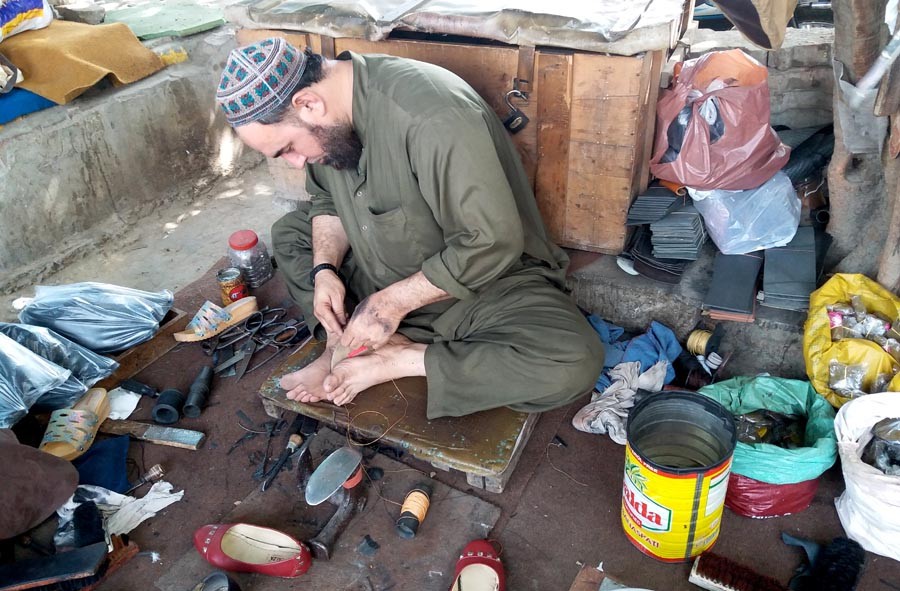

You might have thought and heard people say it’s a dying profession. But business thrives at this cobbler’s shop, or a makeshift mochi’s khokha if you like, in Gulberg’s Main Market, right behind the bus stop.
I first went there a few months back, to get a black leather taweez made (yes, that’s what cobblers also do) and was amazed to see the number of services this small place offered and the sheer efficiency.
A few months later, I needed to get the handle of a hand bag fixed. I was told a cobbler rather than a tailor might be able to help and I went back to the Main Market khokha.
Set up under a shady tree every day of the week, and spread over six by four feet, well almost, the shop is a marvel to look at. A big wooden box that provides the backdrop to the shop holds all the ware at night, under lock and key.
I wonder what comes out of the box the first thing each morning. The inexpensive, plain-coloured rugs that are put on the small wall that divides the road and the car park space -- to make nice seats for customers -- and on the floor. Or, the small tool boxes in both plastic and wood. Or, the naswaar packs. Or, the Peshawari chappals and small leather sheets to be hung on the tree trunk. Or, the shoe polish and brush. Or, the wooden chowkis for the cobblers to sit on. Or, the needles and threads…
Once out, it’s all put in a certain kind of order, in a way the two or three men working at the shop are perfectly at ease with the layout.
Unlike the usual mochis in old mohallas of Lahore who are mostly Punjabis, this one is run by Pashtuns from Bajaur. I hesitantly ask Mohammad Jan, the man incharge who seems in his late 40s, if I could sit for a while and observe and maybe ask him a few questions. He mutters something about being busy but then relents upon my insistence.
Dying or not, this is certainly one profession which you cannot afford to adopt part-time. You have to put in extra hours. It comes as no surprise when Mohammad Jan tells me he opens shop at 7am and closes it by 8.30 in the evening. This they do seven days of the week. That is probably why there is a certain division of labour within the family, where two or three brothers work at the shop for a few months and then go back to the village while the brothers and cousins from the village come take charge.
It is by overlapping duties that they manage to run this shop which Jan says was started "at this very place by my father some fifty years ago". In the next ten minutes, two other men come and assume their place on chowkis. "One is my brother and the other a cousin of mine," Jan informs.
A man comes holding about eight pairs of shoes in a big plastic bag and drops them after a hearty exchange of greetings. I am curious to know what brings these black male shoes here to be told that "they need to be polished". Is it a man from a nearby office, I ask. "No he has come from Sadar Cantt," Jan says. "Our customers come from far and near."
There indeed is a steady flow of customers and, in the hour or so that I am there, the demand and supply of service is strangely synchronised -- the shop becoming neither too full nor empty at any point.
I have often seen small fruit carts forcibly removed from the main roads in this area. Don’t they have to face it too, I ask Jan. "We know many influential people, government servants, having lived here for a long time. So we manage to stay put."
Meanwhile, three men come, one after the other, asking for naswaar and I don’t see any cash exchanged. Two more people come for shoe polish and an oldie wants his sandal stitched. This man who has come from Mini Market used to deal with Jan’s father earlier.
Jan keeps working and dealing with customers in Urdu, Punjabi and of course Pashto. The charges for individual customers don’t exceed Rs30.
How do they compare the scorching weather of Lahore with Bajaur? "That’s the compulsion of work. Our ilaqa (region) is cooler. Under the shade of a tree, it’s so windy and peaceful that you want to fall asleep," recalls Jan with a smile.
Jan and his family live in Ghalib Market closeby in a rented house and have never thought of moving to one of the many Pashtun ghettos "because the commuting time is very less". Jan is not very hopeful about this profession lasting beyond their generation. "I think this kind of work will finish with our generation. Our children do not want to do it neither do we want them to do it. It involves a lot of hard work; it affects the eyesight too."
Like his father, Jan wants to go back to Bajaur and live his later life in the village. Getting up, I ask his younger brother if they knew of the Pakhtun meeting in Mochi Gate on Sunday (today), and how. "Yes, when we go for prayers, our friends from Auriga Complex tell us about it. We will also attend the meeting."